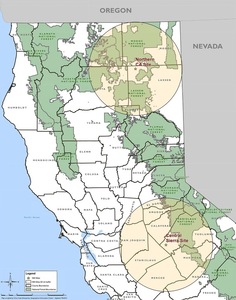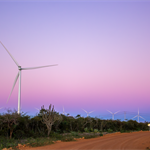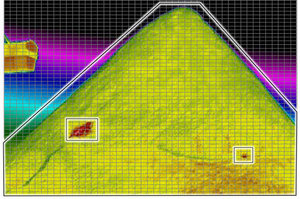California group begins development of 2 industrial pellet plants
Energy Disrupter
ADVERTISEMENT
Golden State Natural Resources, a California-based nonprofit public benefit corporation, is developing two industrial wood pellet projects within the state as part of its effort to increase forest resiliency and reduce the risk of catastrophic forest fires.
GSNR has purchased sites in Tuolumne County and Lassen County to develop the proposed projects. The planned capacity of the Tuolumne site is 300,000 tons per year, with the Lassen site expected to produce 700,000 tons per year. Wood pellets produced at the proposed plants will be railed to port for export to customers that use the biobased fuel for energy production.
The Golden State Finance Authority, acting as the California Environmental Quality Act lead agency, recently released a notice of preparation (NOP) for the GSNR project, referred to as the Forest Resiliency Project. The project aims to procure and process sustainably sourced biomass into wood pellets. Release of the NOP kicked off a 30-day public review and comment period, which closes Dec. 19. The public review and comment period marks a first step under CEQA and will be followed by an environmental impact report (EIR) to assess the project’s potential effects on the environment.
Several public scoping meetings were held in late November and early December as part of the public review and comment period. GSNR President and CEO Greg Norton discussed the project during a virtual public scoping meeting held Dec. 6.
He explained that GSNR was established by rural counties in California. The company’s board is currently made up of elected county supervisors.
According to Norton, GSRN was created to be part of the solution for achieving forest resiliency and reducing risk from catastrophic forest fires. After assessing a number of potential opportunities for the use of low-value biomass gathered as part of planned forest resiliency efforts, GSRN determined that the best long-term sustainable business approach is to produce wood pellets for sale into the export market. Norton cited the proven international market for pellets and the proven, commercially available production technology as factors in that decision.
“Our purpose is to enhance forest health, leading to forest resiliency with a long-term sustainable project primarily through science-based best practice forest thinning and treatments,” Norton said. The GSRN project aims to decrease the risk of catastrophic forest fires while leading to environmental and ecological improvements, enhancing public safety, improving public health through improved air quality, and improving watershed function. The project will also support rural economic development and create jobs, Norton added.
In October 2019, GSFA executed a 20-uyear master stewardship agreement (MSA) with the U.S. Forest Service covering all of region five, which includes all the 18 national forests located in California. The MSA allows GSFA to undertake forest thinning and fuel reduction activities, providing for a potential source of feedstock while meeting Forest Service objectives.
Norton said GSFA is currently targeting the summer of 2023 for completion of the EIR certification and financial close for the projects. Construction on the pellet plants would begin soon after, with completion currently expected in November 2024. The plants could begin commissioning in January 2025. In-forest work is expected to begin in mid-2023, allowing the company to build an inventory of biomass feedstock.
Additional information is available the GSFA website.
















